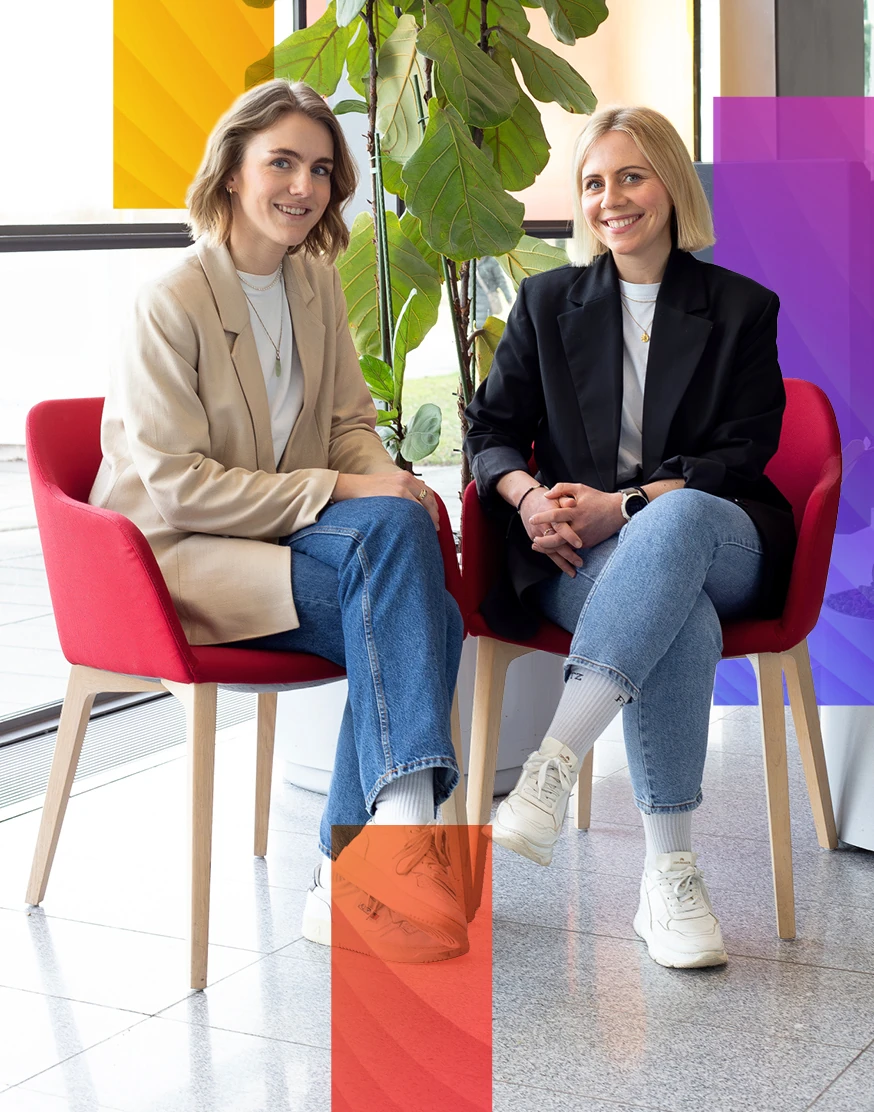Colorful Minds: Interview with Verena Ambros & Lena Gotzler
Published on April 5, 2024 – Translated from German
Not new in politics, still a rarity among the management in German companies, but a reality and actively pursued at msg for banking for over a year now: the management duo. Yet, what exactly does it look like when two colleagues share a management position? How do they make decisions? How do they divide up the responsibilities? How do team members react to it? It's quite simple, really: One department with two department heads. Verena Ambros and Lena Gotzler have been co-managing the same team at msg for banking since the beginning of 2023. Their team is part of the IT Consulting Savings Bank Finance Group business division.
Hello Verena! Hello Lena! Please help us understand how exactly we should envision your job sharing.
Lena Gotzler: It’s quite simple really: There are two of us managing a single department or in other words: One department with two department heads.
Verena Ambros: The key is that each of us, in our role as department head, is equally represented in the decisions we make.

Lena Gotzler (left) and Verena Ambros (right) jointly manage a department at msg for banking.
Hello Verena! Hello Lena! Please help us understand how exactly we should envision your job sharing.
Lena Gotzler: Hello Verena! Hello Lena! Please help us understand how exactly we should envision your job sharing.
Verena Ambros: The key is that each of us, in our role as department head, is equally represented in the decisions we make.
What triggered the decision or rather what was the reasoning behind the decision to share the position?
Verena: There were multiple factors that came into play. On the one hand, I had expressed the desire to work part time so I could dedicate myself to other projects as well. There were also other organizational changes that had a positive impact on this new configuration. However, the most important thing was: Lena was (and still is, of course) a highly-dedicated colleague with a ton of potential and this was a good way to offer her a solid prospect.
Lena: Naturally, there was also the fact that we had been working well together for a very long time and we were a well-rehearsed team by that point.
What triggered the decision or rather what was the reasoning behind the decision to share the position?
Verena: There were multiple factors that came into play. On the one hand, I had expressed the desire to work part time so I could dedicate myself to other projects as well. There were also other organizational changes that had a positive impact on this new configuration. However, the most important thing was: Lena was (and still is, of course) a highly-dedicated colleague with a ton of potential and this was a good way to offer her a solid prospect.
Lena: Naturally, there was also the fact that we had been working well together for a very long time and we were a well-rehearsed team by that point.
What are the advantages of job sharing?
Verena: The model actually offers a number of advantages. For me, of course, the primary advantage is that I can hold a managerial position and work part time. The fact that we are staffing a managerial role with job sharing also opens the door for other employees to take advantage of a more flexible work model and to take on alternative career paths that are better tailored to their individual needs. Which, in turn, leads to greater employee satisfaction as well as employee retention.
Lena: For me, the mutual mentoring is definitely a plus. Verena has more managerial experience and is able to give me a lot of important input and feedback. That meant, I wasn’t thrown into the deep end when I assumed my new role as a manager.
Verena: Furthermore, sharing responsibility also allows both of us to apply our strengths in the most optimal way. As a result, we are able to complete our work much more effectively and are perhaps even a little happier with it as well. In the end, this benefits our team and our customers, and in turn, the company as a whole.
What, in your opinion, is the key to successful job sharing?
Lena: Mutual trust – it doesn’t work without it.
Verena: Lena is 100 percent right there. Trust is the foundation that makes a partnership like this, where we are working together not competing against one another, possible.

Regardless of the division, we are both authorized to make decisions on ALL topics.
Are there any challenges to job sharing?
Lena: Of course, we have our challenges too, but they are important as they are the only way to learn and grow. At the very beginning, it was important to make sure we were both always up-to-date so we weren’t doing everything twice. We had to find the right balance between too much and too little coordination. This required time and patience from both of us and, of course, a lot of communication. It is definitely an area we have to keep a constant eye on.
Verena: Furthermore, it is, of course, very important that we support one another’s decisions. Lena and I have known one another for a very long time so we know each other very well too. We share similar values and mindsets and have a good take on one another. Despite that, there are still times where we have different opinions about things. When that happens, we have an unwritten agreement to not feel personally attacked in those situations and are usually able to constructively explain our positions again later on.

That brings me to my next question: How do you manage to coordinate the same position? How do you divide up your responsibilities and work?
Verena: Regardless of how it is divided up, the fact remains that we are both authorized to make decisions on ALL matters. That is why we don't usually refer to a division of work, but to focal points. We both follow a strengths-based approach. Meaning, we divided our core competences up based on our individual strengths. Thus, within our team, Lena is responsible for customer-oriented topics ...
Lena: ... and Verena for employee-oriented topics. That works really well for us and by defining our responsibilities that way, our team members always know who to contact in case of questions when we are both in the office.
Apropos team members: Did people in your team or your superiors have or continue to have reservations about you as a management duo?
Verena: Of course there were people at the beginning who were very skeptical about the whole concept, but that is normal. People are always apprehensive about change. All in all though, everyone involved took a very positive approach to the model, something that has not only been confirmed in personal discussions, but in surveys as well. We are confident that our honest and transparent communication about the topics was very important here and decisive to its success.
Lena: Oddly enough, the reactions differed by gender. In our specific case, it was men in particular who really needed to know how the division of our management role would work. We received quite a few questions. Women, on the other hand, tended to just be pleased that role sharing was even possible in the first place and trusted we would succeed.
Verena: Naturally, we had to win over our superiors too and convince them. After all, job sharing means changes in all areas, especially when you consider communication channels, joint coordination and the availability of the parties sharing the role. Even if there were a lot of questions at the start and perhaps even some irritation, we received a lot of positive feedback as well. Our mutual agreement process means we can handle topics without having to contact our own managers for feedback. We have a higher level of business maturity in certain matters and questions as well, which also saves our managers time.

It is incredibly enriching to have an additional perspective on some topics.
Your first year of working in tandem is now over, how would you summarize it?
Lena: Everyone can feel the benefits of this model! Having a second perspective in particular and another set of eyes are worth their weight in gold in so many situations. There are challenges on the systems side – many systems cannot adequately map this kind of model, which can mean more effort is required.
Verena: In my opinion, the summary would definitely be positive! Working in tandem motivates us to truly assume responsibility together and to process different topics together. Clear communication is incredibly important, we really notice that! We also think that the division into focal points was the right way to go for us.
All articles from the "Colorful Minds" series

Interview with Katalin Karadi

Interview with Sajit Gangadharan

Interview with Lisa Westerdick

Interview with Verena Ambros & Lena Gotzler

Interview with Martina Rosenow
This might also interest you
Stronger through living diversity - our diversity measures


